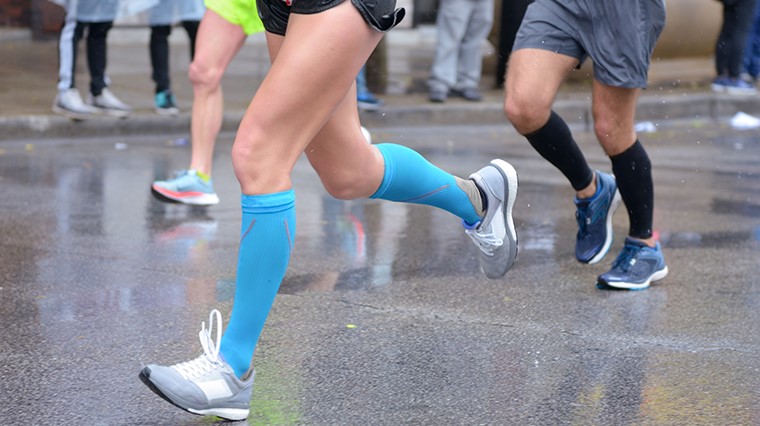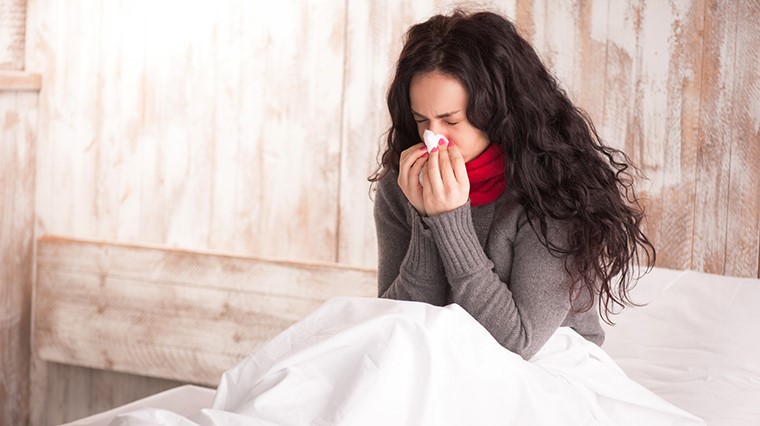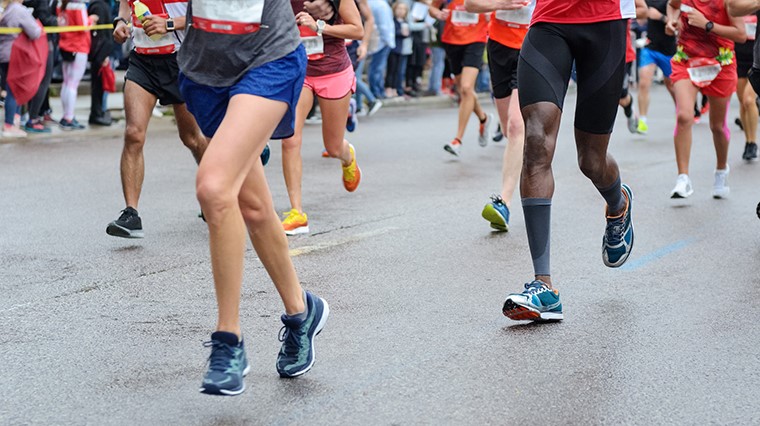Will Running In The Rain Make You Sick?

Ever see a
runner in the rain and think, OMG what a legend?
With flu season
just around the corner (usually May to September in Australia), you might be
reassessing your running routine or tossing up whether or not to sign up for a winter marathon, particularly when the rain clouds roll in.
But did a little
rain ever hurt anybody, or are you just looking for an excuse to hibernate away from the chill?
... But the rain will make you sick (not)
Being wet will make you cold but know that it’s the cold, not the rain itself that makes you
more susceptible to picking up common cold causing viruses called rhinoviruses.
Being exposed to cold may weaken your immune system’s
ability to fight off nasties, but when it comes to runners, it’s a bit of a
juggling act.
Running and your
immune system
At the right balance, performing cardio exercises like
running regularly at moderate levels (for less than 1.5 hours at a time) strengthens your
immune system and the act of moving itself will increase your body temperature,
improving your protection.
However, neglecting to recover properly and overtraining can temporarily impair your immune system as
your body under stress releases the hormone cortisol and provides a window for
viruses to make a home of your body (up to 72 hours post-workout).
If you're not sick, then
why is your nose running like a tap?
Exposure to cold, dry
air can cause weird symptoms like a drippy nose as your respiratory system
produces more mucus to humidify and warm cold air, protecting your delicate
lung tissue from irritation.
In this case, you don’t necessarily have a virus - your nose and mucous membranes are just doing their job in ensuring healthy respiratory function.
But be aware that the cold air can make it trickier for your body to flush out
viruses and bacteria as your mucus thickens and nasal passages become congested
or ‘stuffy’.
You're sneezy, snotty and pretty sure you're sick

Snot gets a pretty bad wrap! Yes, a runny or stuffy nose is also a symptom of the common cold but it’s actually a sign that your immune system is working to rid your body of infection. Like your skin, mucus is one of the first lines of defence – a gloopy barrier rich in antibodies to filter out and expel bad guys that are foreign to your body – bacteria, dust, smog, smoke, cat hair, you name it.
You swallow mucus all the time without even knowing it, but
this helps lubricate and moisten sensitive tissues like your trachea, saving
you from that dry and scratchy feeling in your throat. Swallowing mucus also transports any nasty bacteria or viruses caught in it into your stomach, where the acidic environment
can render them unharmful.
How can you catch the
common cold?
On it's own the cold weather can’t magic up a virus inside you – it’s more complicated than that.
Common cold viruses can be contracted by contact with infected
people and then by touching your eyes, nose or mouth (mucous membranes). They
also can have a party in your body if you inhale tiny droplets from a
contagious person that’s coughed or sneezed close by, even if it was several
hours before.
Depending on the specific virus, temperature, humidity and
surface type, common cold viruses can survive a significant period outside the
body on commonly touched surfaces like doorknobs, taps, light switches and toys.
How can you protect yourself and others during flu season?

It’s important to
take preventative measures all-year round to reduce your risk of infection, but even more so in the colder
months, when we have a tendency to bundle up indoors in close proximity to
others.
As much as you love to snuggle up by a heater in the wintry months, be aware that turning up the heating can drop the humidity and dry out
your virus-fighting mucus, putting you at greater risk of the common cold and influenza,
a less common but more severe condition.
Cover
your mouth when coughing and sneezing (but not with your hands)
Your hands are one of your most useful tools – to chop
veggies, shake hands, exchange money and stacks of other stuff, so it’s
well-worth keeping them free of cold causing viruses.
When you need to, cough or sneeze into a tissue and bin it,
or into your inner elbow that’s less likely to come into contact with other
people or surfaces.
Wash your
hands

Washing your hands frequently with soap and
water (particularly before handling food, eating or after blowing your nose)
keeps germs under wraps and prevents you from becoming infected
with or spreading common cold causing nasties and other viruses.
Disinfectant alcohol wipes can be used in a pinch – an easy
option for when you’re stuck close to a ton of people – like at your workplace,
movie theatre, on public transport or your next marathon.
Use a
humidifier
Cold, wintry air and indoor heating cause a drop
in humidity, which create cosy conditions for viruses to proliferate and spread but using a humidifier can help reintroduce moisture in
the air.
Turn it on when you’re snoozing and you’ll be less likely to wake up with a parched throat or dry, irritated nose.
Stay at home

If you’re sick, stay at home to reduce risk of exposure to other people - cuddle up with a juicy book or de-stress your way as your body fights off the bug. You can get your yoga on if only experiencing mild symptoms, but listen to your body and stick to light sessions.
Stay hydrated
Staying hydrated is an important step
in your winter and all-year round survival kit – helping prevent your sticky mucus from drying out
so it can continue to trap foreign invaders like bacteria and viruses. Mucus will also help cleanse out nasal passages before any nasties can sneak
into your lungs.
What if you're already sick? Can you still go for a run?

That depends - the short answer is no. Ideally, your priority should be on recovering to full health by skipping the run, eating a balanced, vitamin-rich diet and de-stressing as stress whether mental or physical, can impair your immune function.
But…
If nothing is going to keep you from hitting the pavement or missing out on race day,
consider whether your symptoms are above-the-neck or below-the-neck.
Above-the-neck symptoms only like runny nose, sneezing and sore
throat tend to indicate a less severe condition, so it's probably safe even if you’re
feeling a bit germy. If there's any doubt, please check with your doctor to be sure.
On the flip side, below-the-neck systems such as tight chest,
aching muscles, diarrhoea, vomiting as well as difficulty breathing or fever,
mean running and increased exposure to the elements will put you at greater
risk of all-out chest infection and could jeopardise your recovery – just
don’t do it.
Adjust
your runs
You can put your feet up guilt-free until you’re feeling
100% and the bug is busted from your system, but if you do choose to run with minor symptoms or during the
days following your recovery, adjust your usual routine. Temporarily
avoid high intensity sessions, run at a slower, recovery pace and
cut back the distance.
Is there a vaccine
or cure for the common cold?
Currently there’s no cure or vaccine for the common cold, only
treatment to relieve symptoms. For healthy adults, normally it will
naturally resolve within 7 – 10 days. Antibiotics aren’t the answer, as the
common cold is caused by viruses, not bacteria and using them unnecessarily
will decrease their effectiveness in other cases when they would otherwise be
beneficial.
Check in with a medical professional if you’re concerned,
are in a high risk group (e.g. child, pregnant, elderly or have an immune
system impairment) or are experiencing more severe symptoms such as persistent
cough, headaches, fatigue, muscle aches, fever or shaking chills that may
indicate influenza.
Unlike the common cold there is an annual vaccine for influenza, so have a chat to your doc about it to help protect yourself and your family this flu season.
Happy running!
